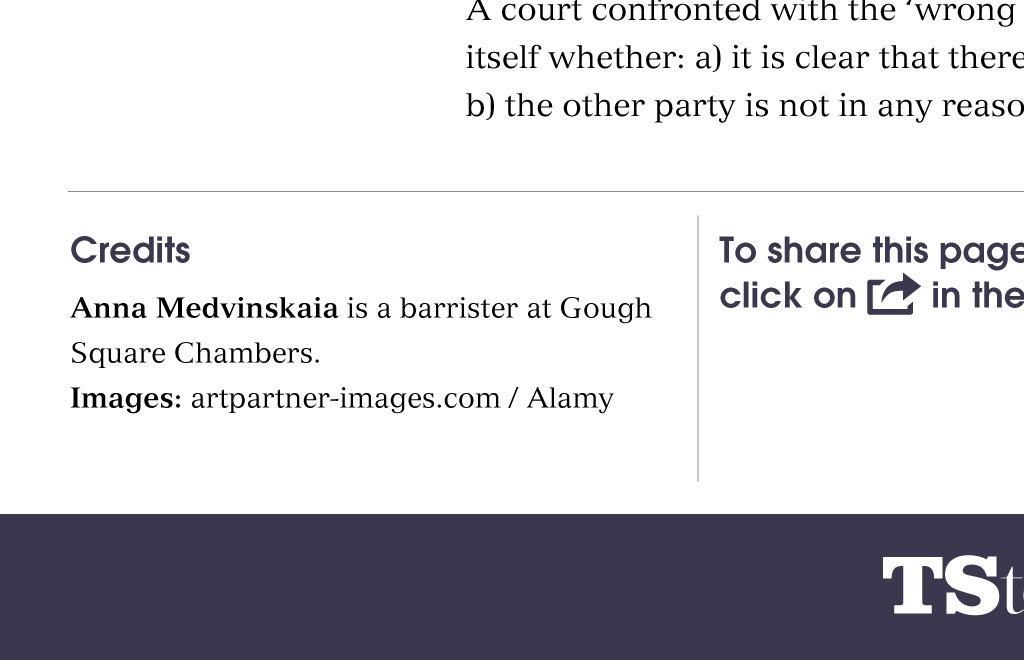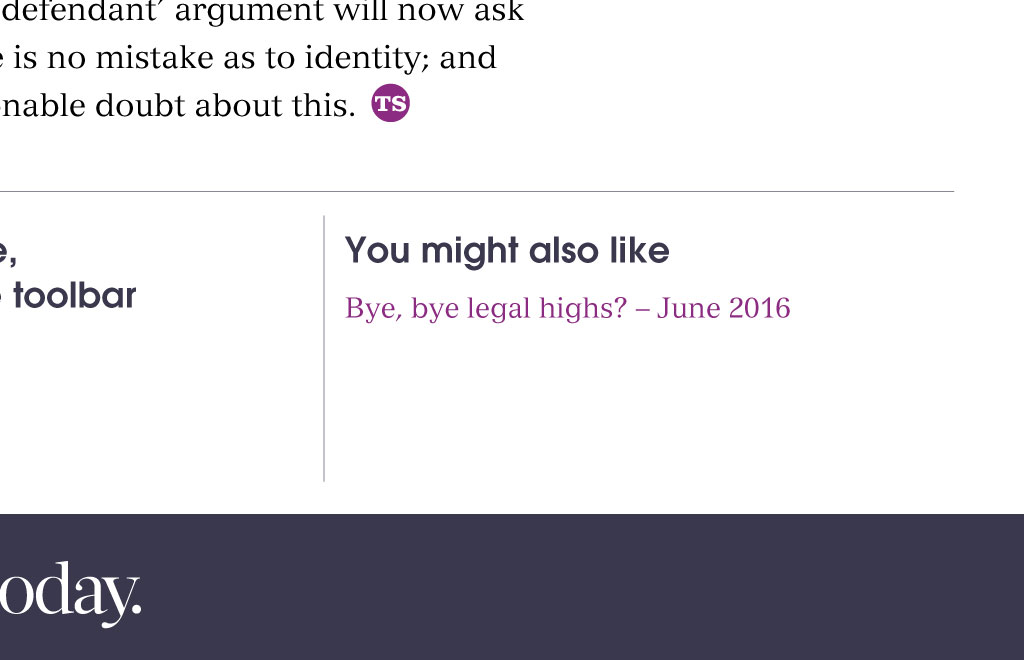


























Legal perspectives: s.123 Magistrates Court Act 1980 In this feature appeals magistrates jurisdiction criminal proceedings Its all in a name The elusive distinction between misnamed or misidentified defendants: Anna Medvinskaia explores a Court of Appeal ruling that has broadened the scope of section 123 of the Magistrates Court Act 1980 T he Royal Borough of Kingston upon Thames (the Council) revoked the premises licence of a nightclub called Essence. Schedule 5 of the Licensing Act 2003 allows the premises licence holder and other specied parties to appeal by way of a complaint to the magistrates court within 21 days of being notied of the decision. The holder of the premises licence in this case was Essence Bars (London) Ltd (Essence Ltd), but the solicitor acting for the nightclub erroneously named FL Trading Ltd (FL) as the complainant in the appeal notice. The notice proceeded to state: TAKE NOTICE that the complainant, the premises licence holder of the premise licence for the premises Essence... intends to appeal against the decision.... FL was, in fact, the parent company of Essence Ltd, a legally distinct company. Wimbledon Magistrates Court and, later, the High Court ([2014] EWHC 4334) ruled that the magistrates court had no jurisdiction to hear the appeal, as FL had no standing to appeal under Schedule 5 of the Licensing Act 2003 and the strict 21-day time limit for appealing had expired. Both courts considered themselves bound by the three decisions of the Divisional Court, construing section 123 of the Magistrates Courts Act 1980: (Marco (Croydon) Ltd (t/a A&J Bull Containers) v Metropolitan Police [1984] RTR 24, R v Greater Manchester Justices ex p. Aldi GmbH [1995] 159 JP 717 and Sainsburys Supermarkets Ltd v HM Courts Service [2006] EWHC 1749 (Admin)). In these cases, the Divisional Court had found that the magistrates court lacked jurisdiction to amend the information to substitute a distinct legal entity where the time limit for bringing proceedings had expired; the mistake was deemed to be one of identity, rather than description, and could therefore not be remedied under section 123. Essence Ltd appealed to the Court of Appeal. The appeal While this judgment has been hailed by some as a triumph of substance over form, defendants wishing to take the wrong defendant point remain at liberty to do so. However, it will be a much more difficult point to make in future The Court of Appeal, with the leading judgment delivered by Beatson LJ, allowed the appeal and remitted the matter to the magistrates court. Beatson LJ identied the relevant test as being: a) whether it is clear that there is no mistake to identity; and b) the other party is not in any reasonable doubt about this. He took the view that the Essence case was distinguishable from the three Divisional Court authorities. In particular, the appeal notice in the present case expressly included a description of the appellant as the premises licence holder, as well as the use of the corporate name. There was no rule, he found, that a mistake concerning a corporate entity was automatically a mistake of identity, or that where a name and a description were used it was the former rather than the latter that identied the parties in question. Beatson LJ considered that the District Judge was, therefore, wrong to conclude that the mere fact there were two corporate entities involved meant there was a mistake of identity, which could not be corrected pursuant to the powers in section 123. Further, he took the view that, where a name and a description were both used in a document, it would not necessarily be the former that identied the party in question unless the maker of the mistake realised the named person was not the person who satised the description. Beatson LJ deemed it appropriate to adopt a generous interpretation of mistake as to name, such as that found in the Civil Procedure Rules 1998 (CPR), provided that the other party was not in any reasonable doubt as to the identity of the relevant person. The fact that the relevant period for bringing proceedings had expired was not conclusive if the correct legal person was before the court, but had been misnamed or misdescribed. Nevertheless, Beatson LJ took the view that the notice of appeal did not: 71. ...[make] it ineluctably clear that the entity appealing was Essence, the appellant in these proceedings, as opposed to it being FL who, as Mr Grant submitted, was mistakenly identied as the premises licence holder. Nor do I consider that, adopting the Divisional Courts approach to section 123, it can be said to be ineluctably clear that the licensing authority was not in any reasonable doubt about the identity of the appellant/complainant. Accordingly, the matter was remitted to the magistrates court to determine the following questions: 1. Whether, on the facts of this case, the document misdescribed the name of the premises licence holder who was the appellant/ complainant, or whether notwithstanding the reference in it to the complainant, the premises licence holder in the circumstances of this case the identity of the appellant was FL. 2. If the mistake was one as to description, rather than one as to identity, whether the other party (the licensing authority) was not in any reasonable doubt about the identity of the appellant, applying the approach of the Divisional Court to the test formulated by the Justices in Marcos case and noting the analogy of the cases involving the CPR. The implications The judgment signicantly widens the scope of section 123 of the Magistrates Courts Act 1980, in spite of the various implications for licensing law identied by Beatson LJ, including: G The express decision by parliament to limit those entitled to appeal under Schedule 5 of the Licensing Act 2003 G The fact that it would largely remove the need for the applicant/ complainant to comply with any rule or procedure in the magistrates court G In the present context it would also mean that the limitation period set out in paragraph 9 of Schedule 5 to the 2003 Act can be circumvented It is clear, therefore, that the Court of Appeal judgment has signicant implications for licensing appeals. But might the principles also apply to ordinary criminal proceedings? The issue to be determined was dened narrowly by Beatson LJ at the outset of the judgment: 2. ...Is there power to amend a notice of complaint in civil proceedings in the magistrates court by substituting the name of the company which, as premises licence holder, has standing to appeal for the name of another company that does not have standing to appeal? There is no good reason, however, to think that the judgment is restricted to civil proceedings in the magistrates court. This is particularly so in view of the fact that the three Divisional Court cases on which reliance had been placed in the Essence case all concerned amendments within the context of criminal, rather than civil, proceedings. The Court of Appeals list of reasons for distinguishing those cases did not include the difference between civil and criminal proceedings. Beatson LJ also made it clear that section 123 was not to be construed differently where the mistake was made by an appellant, rather than by the prosecution; section 123 is not conned to defects in process affecting a defendant. While this judgment has been hailed by some as a triumph of substance over form, defendants wishing to take the wrong defendant point remain at liberty to do so. After all, the Court of Appeal distinguished the Essence case from the Divisional Court cases of Marco, Aldi and Sainsburys, rather than overruling them altogether. Importantly, the Court of Appeal made it clear that the rst requirement that is, that it was clear there was no reasonable mistake as to identity was not met in those cases. It is likely, however, that the wrong defendant point will be much more difcult to make in the future. A court confronted with the wrong defendant argument will now ask itself whether: a) it is clear that there is no mistake as to identity; and b) the other party is not in any reasonable doubt about this. Credits Anna Medvinskaia is a barrister at Gough Square Chambers. Images: artpartner-images.com / Alamy To share this page, in the toolbar click on You might also like Bye, bye legal highs? June 2016